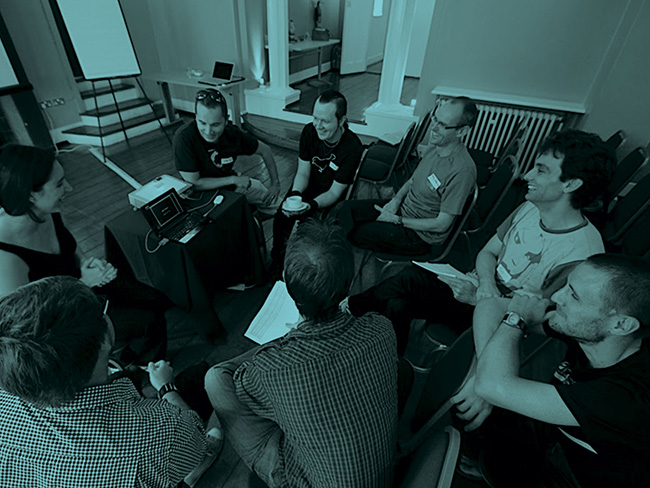
More about Shifting Culture, Less About Investing in Potential
The question isn’t whether or not to use data science; we are living in the world of Big Data and those unable to adopt these approaches will be rapidly left behind as numerous studies show1. The question is whether companies can be taught to shift their people, processes and vision to be aligned with driving data science into their value proposition so that it is relevant and competitive.
Data Science is often brought to companies as a potential game changer, with an investment that may pay off if the company's data can be leveraged to provide insight and gain a competitive edge. But positioning data science as an “add-on” offering that might offer potential to the larger business initiatives misses the mark.
Data science is viewed by many as today's answer to our most pressing enterprise and socially innovative challenges. This is motivated by the data-driven nature of our markets and society as a whole. If an investment in data science does not pay off for an organization it is rarely a symptom of the offering, but rather a sign that the organization lacks the culture required to make 'competing by the numbers' a reality.
This article will look at how today’s market is forcing organizations to not only embrace Big Data, but importantly, that in order to glean a real ROI from these new technologies and approaches, companies must transform their cultures to ones focused on using data effectively.

Markets are forcing companies to embrace Big Data not because there is so much available, but because both businesses and consumers are redefining what it means to deliver value. Most organizations are rapidly moving into the Big Data market where their technically savvy consumers are using commoditized solutions. This means that the consumer in B2C is becoming less reliant on traditional consumerism and that the receiving businesses in B2B are using cheap, self-service tools that do not require the services of an external business.
Staying competitive means finding a way to still offer value to individuals and businesses in a world becoming more self-driven and technology savvy. Amazon is not competitive because of the great books and other items it offers. It is competitive because it uses data in a way that brings value to the online consumer experience. It takes advantage of current consumer habits and massive transaction data to deliver value to its customers.
To still offer value to savvy clients and be competitive in today's market, companies need to leverage data intelligently using approaches that complement their domain expertise.
Data science complements domain expertise and values; it does not complement outdated technology or a myopic and irrelevant culture.
Culture gets to the heart of available data, legacy infrastructure, red-tape prerequisites for approvals, company vision, and the willingness to adopt proposed solutions. All the potential in the world will not deliver value if the organizational culture is not aligned with feeding data-driven solutions directly into the company's value proposition; the promise made that what gets delivered will be granted by the company and experienced by the customer.
Changing culture is a challenge for any organization but one that is also inevitable as companies grow and enter into larger and more diverse markets. Building a Big Data culture means looking beyond new technology and algorithms, and understanding change as an organic process that is guided by an information-rich market. This begins with communication and ensuring that all employees are aligned with the new vision. This requires listening, and building understanding so that the opportunities afforded to an organization by Big Data are valued by the company as a whole2.
According to the the IDC’s Big Data forecast, Big Data technology and services will reach $32.4 billion in market saturation by 2017; a growth rate 6 times higher than mainstream Information Technology3. Many suggest that we will easily outpace the IDC’s forecast given the explosive demand for advanced analytical solutions we see today. This demand is fueling the need for a cultural shift as companies race to prepare themselves for their data-savvy competition, and self-reliant consumers.
Looking at some of the recent success stories shows us companies that have taken on Big Data initiatives and transformed their cultures into ones focused on effective use of data. The global technology giant Xerox recently changed its approach to employee attrition by capitalizing on the millions of records related to employee behavior4. By using this data to build predictive models, Xerox forecasts when an employee is looking to leave and acts accordingly to boost retention. They have reported a stark change in employee performance and morale, and have better positioned themselves to hire new talent.
As another example, UPS has transformed their entire delivery service by utilizing advanced analytics to maximize the efficiency of their operations5. At 102,000 drivers globally, 3.3 billion road miles a year, and 10,000 trucks on the road they need to ensure that the maximum number of trucks are operational at any given time. They have used advanced data mining to make possible “preventative maintenance” by proactively addressing repairs and downtime instead of reacting after-the-incident.
Another example is Southwest Airlines, one of the most respected airlines in the world. They recently shifted their approach to delivering quality customer service by tapping into the power of data science6. Real-time KPIs are delivered to, and collected from, frontline workers via intelligent dashboards related to operational and strategic goals while speech analytics is used to extract meaningful information from recorded client interactions. Advanced analytics has resulted in less guessing about client needs, and more proactive operations that can now anticipate these market demands.
If there is significant evidence for the advantages of using Big Data why do we still see organizations failing to effectively implement data science initiatives? While the symptoms & superficial causes might vary, the root cause of the problem is usually culture. Technology and advanced learning-algorithms are great, but only when backed by leaders and frontline personnel who collectively work towards their effective implementation. In the absence of a data-savvy culture that understands the benefits of Big Data, and the need to compete analytically, the new tools and techniques never move from the sexy tagline stage to a place where ROI is possible. To realize the potential of data science across organizations we need to dive into what it takes to change organizational culture and look to frame these steps in the context of Big Data.
There are numerous studies on how to best change an organization’s culture, but we can identify three recurring themes and speak to these as they relate to Big Data. These include an organization’s self-awareness, leadership’s attitude towards using a new approach, and effective communication that aligns the new vision with all employees.

#1 Self-awareness
Getting a client to be culturally self-aware can be an uphill battle. Change is not possible without a clear vision of where a company presently stands and how this position mitigates their ability to grow alongside an information-rich market. The individual and collective gaps to an analytical mindset need to be identified to effectively move an organization towards a real-world analytical capability. These gaps will manifest themselves as people and processes that are not in-tune with using data science as the lifeblood to decision-making. In order to remove the problems and fill the gaps we must move from honest assessment to proactive steps in order to fill in these missing pieces.
#2 Leadership's Attitude
In addition, an organization’s leadership should not stop at the adoption of rapid data-visualisation and charts and proceed to promote the use of advanced analytics as their primary tool to competing in the market. Leadership plays a strong role in motivating individuals within the company to produce value and manage subsets of the organization effectively. Are managers on board with moving away from their reliance on intuition, and instead basing their decision-making on discovered patterns culled from data? Effective leadership will encourage employees to adapt the skills they currently have to the new data-driven value they want to bring to the market.
#3 Effective Communication
Finally, there must be excellent ongoing communication that goes beyond motivational posters and team-spirit emails from the CEO. The new vision of the company must be expressed as a journey that is visualized and iterated on as an organization. Employees must understand why their company sees Big Data as a must-have approach and how their individual role fits into that larger picture. Communication must be tailored to the multiple perspectives and assumptions of various departments. The journey needs to be expressed in terms of the data those departments have and how they can creatively use that data to support the company’s new vision.
In parallel to these three themes is the current state of data and technology held and used by the company. A cultural shift will involve reevaluating what information is currently collected, how it is disseminated and used, how it complements employee training and organizational standards, and most importantly how it lives inside products and services directly impacting the organization's value proposition. Each of the above should be inline with using data science effectively and each piece is ultimately dependent on the company culture being willing and ready to move forward.
In summary, the three key points in preparing an organization for the Big Data market and ensuring real-world ROI is delivered going forward:
- encouraging self-awareness by identifying the individuals, processes, and antiquated belief systems that are contrary to competing analytically;
- encouraging leadership to embrace Big Data and to motivate all levels of their organization to deliver data-driven value; and
- to promote ongoing communication that speaks to all departments and relates their unique skillsets to the new vision.
Shift the culture, and the unparalleled advantages to utilizing data science will naturally follow.
References
- https://www.amazon.com/Competing-Analytics-The-Science-Winning/dp/1422103323
- http://roico.com/articles/Article_FourEssential.pdf
- http://www.idc.com/getdoc.jsp?containerId=prUS24542113
- http://www.forbes.com/sites/danielnewman/2014/07/01/big-data-roi-making-better-decisions-that-drive-community-retention-and-revenue/
- http://www.cnet.com/news/ups-turns-data-analysis-into-big-savings/
- http://www.bigdata-startups.com/BigData-startup/southwest-airlines-uses-big-data-deliver-excellent-customer-service/
- http://www.ccl.org/leadership/pdf/solutions/TYO.pdf
Disclaimer: The statements and opinions expressed in this article are those of the author(s) and do not necessarily reflect the positions of Thoughtworks.














